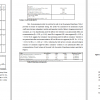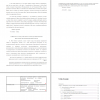Тема: Personalization as Phenomenon in Online Retail Context: Consumer Characteristics Affecting Intention To Use Personalized Offers
Закажите новую по вашим требованиям
Представленный материал является образцом учебного исследования, примером структуры и содержания учебного исследования по заявленной теме. Размещён исключительно в информационных и ознакомительных целях.
Workspay.ru оказывает информационные услуги по сбору, обработке и структурированию материалов в соответствии с требованиями заказчика.
Размещение материала не означает публикацию произведения впервые и не предполагает передачу исключительных авторских прав третьим лицам.
Материал не предназначен для дословной сдачи в образовательные организации и требует самостоятельной переработки с соблюдением законодательства Российской Федерации об авторском праве и принципов академической добросовестности.
Авторские права на исходные материалы принадлежат их законным правообладателям. В случае возникновения вопросов, связанных с размещённым материалом, просим направить обращение через форму обратной связи.
📋 Содержание
ABSTRACT 4
АННОТАЦИЯ 5
Introduction 8
Chapter 1. PERSONALIZATION AND CONSUMER BEHAVIOR 12
1.1. Personalization in online retail 12
1.1.1. Personalization 12
1.1.2. Recommendation systems 13
1.2. Consumer characteristics and behavioral intention 14
1.2.1. Intention to use personalized offers and recommendations 14
1.2.2. Shopping orientation 15
1.2.3. Deal proneness 16
1.2.4. Privacy concerns 18
1.2.5. Reactance 20
Chapter 2. RESEARCH DESIGN AND DATA COLLECTION. RESULTS OF DATA
ANALYSIS 22
2.1. Quantitative part. Online survey 22
2.1.1. Methodology 22
2.1.2. Results 25
2.2. Qualitative part. Semi-structured interviews 28
2.2.1. Methodology 28
2.2.2. Results 31
Chapter 3. DISCUSSION OF THE RESULTS 40
3.1. General discussion and theoretical implications 40
3.2. Managerial implications 42
3.3. Limitations of the study and suggestions for future research 43
Conclusion 45
References 47
Appendix A. Interview Guide 53
Appendix B. Example Excerpts from Interview Transcripts 56
📖 Введение
Recent literature on marketing and consumer behavior indicates the importance of managing customer experience and customer engagement by companies (Lemon & Verhoef, 2016; Gogua & Smirnova, 2020; Grewal et al., 2017). Personalization and personalized recommendations in particular helps companies to provide a better customer experience, enhance engagement and brand loyalty (Basu, 2021). Considering the importance and relevance of the study of consumer perception of personalization activities in online retailing context, the focus of this paper falls into exploring consumer behavior in relation to personalized offers and recommendations in online stores.
This study investigates the behavioral intention of consumers to use personal offers and recommendations because intention is the main predictor of consumer behavior (Ajzen, 1991). Characteristics of consumers which are studied in this paper as determinants of behavioral intention to use personalization are divided into two groups: 1) online shopping related characteristics - shopping orientation and deal proneness (since this study examines personalization and consumer behavior towards it in online retail context); 2) psychological characteristics of consumers that are connected to the implementation of personalization marketing strategies by companies - privacy concerns and reactance. All these consumer characteristics are widely studied in contemporary marketing research; special interest of the author lies in expanding the existing knowledge on these consumer characteristics constructs as well as investigating the relationship between these consumer characteristics and consumers’ intention to use personalized recommendations. To the best of author’s knowledge, there are no papers among currently existing studies which examined the integrated framework of the influence of such consumer characteristics as shopping orientation, deal proneness, privacy concerns and consumer reactance on their usage intention of personalized offers and recommendations in online shopping context. To address this gap, the present study is conducted.
The purpose of the present study is to investigate how consumers’ online-shopping related characteristics (shopping orientation and deal proneness) and psychological characteristics (privacy concerns and reactance) influence consumers’ intention to use personalized offers and recommendations in online retailing context.
Objectives of the study are the following:
1. Develop a theoretical model of the influence of four characteristics of consumers (shopping orientation, deal proneness, privacy concerns and psychological reactance) on their intention to use personalized offers and recommendations in online stores.
2. Test the developed model by analyzing quantitative data collected through the survey.
3. Conduct 10 semi-structured interviews to gain detailed consumers’ insights about their intention to use personalized offers and recommendations within the framework of the developed theoretical model.
4. Analyze and compare the results of two methods, make conclusions, and determine suggestions for future research.
Research questions:
1. What are the relationships between consumers’ characteristics (online shopping related and psychological) and consumers’ intention to use personalized recommendations?
2. How are the various dimensions of the studied characteristics of consumers related to their intention to use personalized offers in online stores?
...
✅ Заключение
This study aimed at investigation of how characteristics of consumers (shopping orientation, deal proneness, privacy concerns and reactance) influence consumers’ intention to use personalized offers and recommendations in online retailing context. Using sequential mixed methods research design allowed to get a comprehensive view on the relationships between all these consumers’ characteristics and personalized offers usage intention. The results showed that both dimensions of shopping orientation (hedonic and utilitarian) of consumers lead to increased intention to use personalized offers. Consumers see personal offers in online stores as help and support in finding the necessary goods or considering different alternatives and choosing the best option among them. Deal proneness of consumers also positively affect their intention to use and rely on personalized offers and recommendations. As it was hypothesized, deal prone consumers tend to respond to personalized price offers and promotions but only if these personal offers correctly match their current preferences.
Privacy concerns of consumers, in contrast, diminish their intention to use personalized offers. Consumers who have low level of concern about privacy of their personal data are ready to provide the required personal data to online stores in order to receive suitable and useful personalized offers. Moreover, if these consumers concern about more sensitive types of data (mobile phone number, passport data, and banking card information), they are less willing to provide such data but their intention to use personalized offers does not decrease since consumers understand that such types of data should not be used by online stores for providing personalized offers. Comparison and analysis of results of both quantitative and qualitative methods led to the conclusion that psychological reactance of consumers have no influence on their intention to use personalized offers since consumers do not perceive them as something that contradicts their freedom. They perceive personalized offers and recommendations just as support in the process of online shopping.
The present study also has practical value for online retailers. The results allow to make suggestions for online retailers in the implementation of personalization strategies with the use of personalized recommendation algorithms: personalized offers should clearly match current consumers’ preferences and contain personalized price promotions and discounts.





